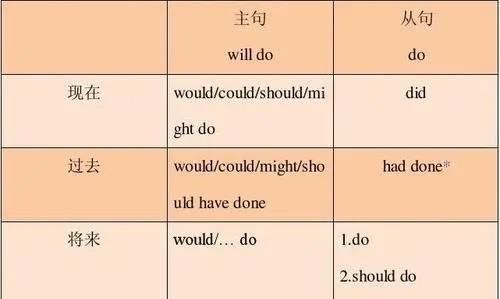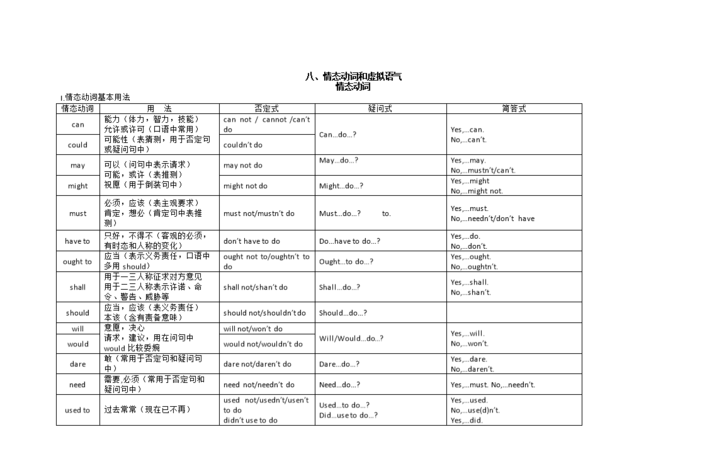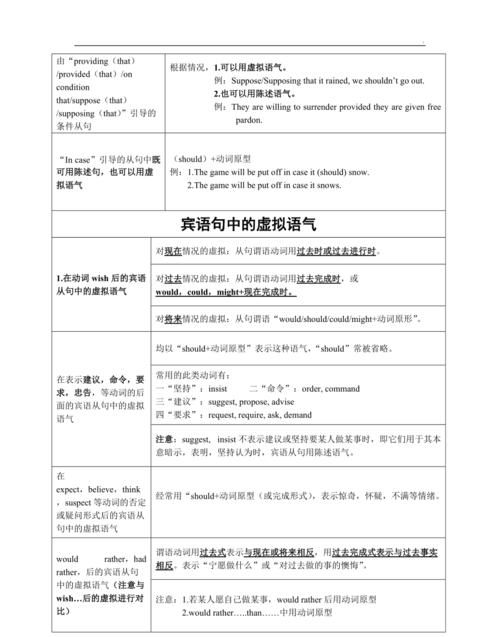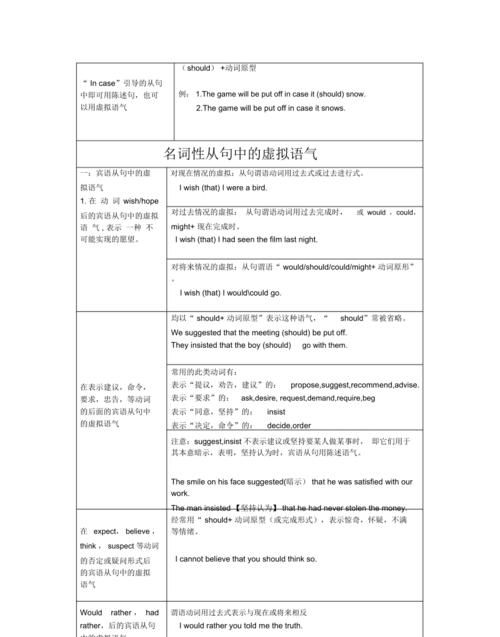本文目录
虚拟语气一二三四口诀例句
虚拟语气顺口溜:一坚持,二命令,三建议,四要求。
“一、二、三、四”,即一个坚持(insist),两个命令(order,command),三个建议(suggest,propose,advise),四个要求(demand,require,request,ask)。这些动词或名词后的从句需用虚拟语气,即从句的谓语用should+动词。

英语中的语气分为陈述语气、祈使语气、虚拟语气、疑问语气和感叹语气五类。
虚拟语气的应用条件:在表示假想的虚假的、与事实相反的或难以实现的情况时用虚拟语气,表示主观愿望或某种强烈情感时,也用虚拟语气。
即当一个人说话时欲强调其所说的话是基于自己的主观想法,愿望,假想,猜测,怀疑或建议,而不是根据客观实际,就用虚拟语气。主要是英语语法的一种表达。
英语虚拟语气笔记整理
虚拟语气是英语语法考试中的重点,那么你掌握了吗?下面是我为你整理的英语虚拟语气的语法的相关资料,希望大家喜欢!
英语虚拟语气的语法归纳
虚拟语气(Subjunctive Mood)这一语法项目是各类英语考试中心测试的重点之一。虚拟语气是一种特殊的动词形式,用来表示说话人所说的话并不是事实,而是一种假设、愿望、怀疑或推测。
Ⅰ用以表示虚拟条件的虚拟语气
⒈ 用if条件从句表示的虚拟条件,是虚拟条件最普通的方式。
① 虚拟现在时表示与现在事实相反的假设,其if 从句的谓语形式用动词的过去式(be 一般用were),主句用would/ should/ could/ might +动词原形,例如:If I were in your position I would marry her.
② 虚拟过去时是表示与过去事实相反的假设,if 从句的谓语形式用过去完成时即had+过去分词,主句用would / should / could / might + have +过去分词,例如:If it had not rained so hard yesterday we could have played tennis.
③ 大多数的虚拟条件句属于上面三种情况的一种,但并不排除存在条件和后果中,一个和现在情况相反,另一个和过去情况相反,例如:If you had followed what the doctor said, you would not have been so painful now.这个句子在高中出现频率颇高。
④ 但是,如果后果用了虚拟语气,而条件却用陈述语气,这种用法是错的。
⒉ 除了表示虚假条件外,if从句还可以表示对将来的推测,由于是将来还没有发生的,所以谈不上是真实的还是虚假的,只能说这个事情发生的可能性有多大。一般情况下,可以用陈述语气的if从句来表示对一个未来事实的推测,这个事实是完全可能发生的。If从句的谓语形式用一般过去式或用were to / should +动词原形,主句用would / should /could/ might +动词原形,例如:Jean doesn't want to work right away because she thinks that if she were to get a job she probably wouldn't be able to see her friends very often.(1996年1月四级第44题)
⒊ 有时可以把含有助动词、情态动词、be或have的虚拟条件句中的连词if 省去,而将had , should, were 等词提到主语之前,即用倒装结构,这时候,如果出现not等否定词,否定词需放在主语后面。这种结构在口语中很少使用,但频频出现在各类考试中出现,例如:If it had not rained so hard yesterday we could have played tennis.→Had it not rained so hard yesterday, we could have played tennis.
⒋ 大多数的虚拟条件通过上面所讲的两种方法表达,但在个别句子中也可以通过介词without和介词短语but for表达,副词otherwise等表达出来。例如:We didn't know his telephone number; otherwise we would have telephoned him.(1995年6月四级第46题)值得注意的是,包含but for的句子,谓语动词必定要用虚拟形式,但包含without等短语的句子,谓语动词未必一定要用虚拟语气。
⒌ 有时虚拟条件不是明确地表达出来,而在蕴含在用but引导的从句里,于是便出现了有谓语动词是虚拟语气的主句加上谓语动词是陈述语气的but从句构成的并列复合句,例如I would have hung you but the telephone was out of order.在这样的句子里,如果主句没有用虚拟语气,或者从句用了虚拟语气,都是错的。
Ⅱ用在宾语从句中的虚拟语气
⒈ 在表示愿望的动词wish后的宾语从句中,需用虚拟语气。(wish后的that 常省略),根据主句时态,从句谓语时态相应退后一位,例如:How she wished his family could go with him.
⒉ 在具有愿望、请求、建议、命令等主观意愿的动词(desire, demand, advice, insist, require, suggest, propose, order, recommend, decide …) 后的宾语从句中需用虚拟语气。谓语动词用(should) +动词原形。值得注意的是,如果宾语从句的动词是否定的,否定词not的位置应在动词之前,而不是动词之后。例如:The head nurse insisted that the patient not be move.另外,如suggest表达“暗示”,insist表示“坚持某种说法”时,后面的从句不用虚拟语气,例如:Her pale face suggests that she is ill.或He insisted that he did not kill the boy.
除此之外,上述动词也要求用虚拟式
① 在It is+上述动词的过去分词,其后所跟的主语从句中,如It is suggested that pupils wear school uniforms.
② 在上述动词相应的名词形式作主语+连系动词,其后的表语从句中,例如His suggestion was that classed be re-scheduled.
③ 在对上述动词相应的名词进行解释的同位语从句中,如:The workers raised the demand that their pay be increased to cope with the inflation.
⒊ would (had)rather , would sooner也用来表达主观愿望,它们之后的宾语从句中需用虚拟语气。谓语动词用过去式表示现在或将来,用过去完成式表示与过去事实相反,例如:I would rather he went right now.
Ⅲ其他形式的虚拟语气
⒈ it is +necessary等形容词后,that主语从句中虚拟形式使用,这类形容词包括necessary, important, essential, imperative, urgent, preferable, vital, advisable等,例如It is necessary that you listen to the teacher carefully.或者It is essential that you be able to pronounce every single word correctly.
⒉ 在It's (high/about) time 之后的定语从句中需用虚拟语气。谓语动词用过去式,例如It is high time that you went to school
⒊ 虚拟语气在as if / as though 引导的方式状语从句中的应用(谓语动词形式与wish后的宾语从句基本相同)表示与现在事实相反或对现在情况有怀疑,谓语动词用过去式。例如:He felt as if he alone were responsible for what had happened. 表示过去想象中的动作或情况,谓语动词用过去完成式。
⒋ 在lest 引导的状语从句中,谓语动词多用虚拟语气,(should )+ 动词原形。例如: The mad man was put in the soft-padded cell lest he injure himself.(1998年1月四级第38题)
⒌ 在if only 引起的感叹句中需用虚拟语气。谓语动词用过去式或过去完成式。例如: Look at the terrible situation I am in! if only I had followed your advice.
虚拟语气的时态
一、过去式:
if 从句:had done
英语语法:虚拟语气的时态
主句:情态动词(would,could,might,should)+have done
英语语法:虚拟语气的时态
二、现在式:
if 从句:did/were
英语语法:虚拟语气的时态
主句:情态动词(would,could,might,should)+do
英语语法:虚拟语气的时态
三、将来时:
if 从句:①should/shall do
②were to do
③did/were
英语语法:虚拟语气的时态
6
主句:情态动词(would,could,might,should)+do
虚拟语气在条件从句中的用法
(一)形式 注:
1.在从句中,be动词多用were的形式。在口语中,如果主语是第一、第三人称单数的话,be动词可用was,但人们总是说:If I were you...
2.主句中的谓语可以由would,should,could和 might这四个不同的情态动词来构成。
3.与将来事实相反的条件从句中,谓语有三种不同的形式:过去式、were +to do或should +do。 例句1:If I were you,I would study hard.我要是你的话,我就会好好学习。(与现在事实相反) 例句2:If I had studied hard,I would have passed CET-6 last semester.我要是早就好好学习的话,那么我上个学期就通过六级考试了。(与过去事实相反) 例句3:If Iwere to pass CET-6,I would treat you to dinner at KFC.我要是过了六级考试,就请你去吃肯德基。(与将来事实相反)
(二)省略/倒装 如果在虚拟从句中包含有一个助动词、情态动词、动词be或have,则可把if省略,把上类动词提到主语之前,使用倒装语序。
例句4:Had it not been for the PLA,we wouldn’t have been able to beat the flood.4要不是人民解放军,我们是无法战胜洪水的。
例句5:Were he here now,he would certainly help me.5他要是在这里肯定会帮我的忙。 注4:例句4中的从句部分出现了否定词not,如果把该句还原成正常语序,应该是: If it hadn’t been for the PLA,we wouldn’t have been able to beat the flood.
但是一旦句子发生了省略,就必须把hadn’t分开,否定词not还原,放在主语之后,不可写成Hadn’t it b

英语语法虚拟语气教学设计
英语语法有词类也有句型,我们现在来看看虚拟语气的用法。下面是我给大家整理的英语语法虚拟语气讲解,供大家参阅!
英语语法虚拟语气讲解:if only后的句子用虚拟语气
if only 与 I wish一样,也用于表示与事实相反的愿望,其后所虚拟语气的时态与 wish 后所接时态的情况相同:
If only she had had more courage! 她再勇敢一些就好了。
If only it would stop raining! 雨要是停了就好了。
If only he didn't drive so fast. 但愿他车没开得那么快。
If only I were [was] better looking. 要是我长得漂亮些就好了。
If only I had listened to my parents! 我要是当时听了父母的话就好了。
If only she would go with me! 她要是愿意和我一道去就好了!
【友情提示】if only 通常独立使用,没有主句。
英语语法虚拟语气讲解:would rather后的句子用虚拟语气
would rather后接句子时,句子谓语习惯上要用虚拟语气,具体用法为:
1.一般过去时表示现在或将来的愿望
I'd rather you went tomorrow (now). 我宁愿你明天(现在)去。
I'd rather you came next Saturday. 我宁愿你下星期六来。
I'd rather you were happy. 我愿你快乐。
I'd rather she sat next to me. 我宁愿她挨着我坐。
I'd rather Jack left on an earlier train. 我宁愿杰克乘前一班火车走。
You always go without me and l'd rather you didn't. 你总是不带我去,我可不愿意你这样。
“Shall I open the window? ” “I'd rather you didn't. ”“我要不要把窗子打开? ” “我看不要打开好。”
2. 用过去完成时表过去的愿望
I'd rather you hadn't said it. 我真希望你没有这样说过。
I'd rather you hadn't done that. 我宁愿你没这样做。
l'd rather you had been / hadn't been present。我 (宁) 愿你当时在场 / 不在场。
l'd rather he had told / hadn't told me about it 我 (宁) 愿他告诉了 / 未告诉我这件事。
Katie went by car and I'd rather she hadn't. 凯蒂是坐汽车去的,我宁愿地不坐汽车去。
英语语法虚拟语气讲解:虚拟语气用在条件状语从句中
虚拟语气是一种特殊的动词形式,表示所说的话不是一个事实,而只是一种假设,愿望,建议,怀疑,猜测或不大可能实现的空想。
I.虚拟语气用在条件状语从句中
虚拟语气用在条件状语从句中,通常从句由连词if 引导。
1.与现在事实相反的虚拟条件句
条件状语从句主句
If +主语 +动词过去式主语+ would, should, could, might+原形动词
(be的过去式用were)
例如:
If I feared death, I wouldn't be a communist.
(刘胡兰)怕死就不做共产党员。
If there were no air, we couldn't live.
如果没有空气,我们就不能生活。
Example:
I would ask George to lend us the money if I ______ him.
A. had known B. knew C. have known D. know
I _____ it to him if I thought he would understand.
A. shall explain B. will explain C. would explain D. explain
2.与过去事实相反的虚拟条件句
构成
条件状语从句主句
If + 主语 + 动词过去完成式主语 + would, should, could, might+have + 过去分词
例如:
If you had come a few minutes earlier, you would have met him.
如果你早来几分钟,你就会碰上他。
If there had been no air in the tube, the result of the experiment would have been more accurate.
如果试管中没有空气,实验结果就会更精确。
Example:
If you hadn't gone with Tom to the party last night, _______.
A. you would meet John already
B. you won't have missed John
C. you will have met John
D. you would have met John
3.与将来事实相反的虚拟条件句
构成
条件状语从句主句
If + 主语+ should +原形动词主语+would,should,could,might或were+不定式+原形动词
例如:
If he were to come tomorrow, things would be easier.
假如他明天会来,事情就容易办了。
If the sand should be broken up, it would give out much energy.
如果沙子能被分解,它会释放出大量的能量。
注:在表示与将来事实相反的虚拟条件句中,从句中的should有时可以省略。如:
If he make the design, he might do it in some other way.
要是他来搞这个设计,他可能用另外的方法设计。
Example:
If the sea ____ to rise 50 feet, India would become an island.
A. will B. is C. was D. were
If you ____ to see Mary, what would you tell her?
A. are B. will be going C. must D. were
We might still catch the train if we ___.
A. make hurry B. haste
C. make haste D. hastily
4.错综时间的虚拟语气
在一些含有虚拟语气的句子中,如果主句与从句的谓语表示不同的时间,虚拟语气可有不同形式,即主句与从句各自按自己的时间构成虚拟形式。例如:
If I had met him before, I could recognize him.要是我以前遇见过他,我就能认出他了。
(从句表示与过去事实相反,主句表示与现在或将来事实相反)
If we were driving at a speed of 100 Li an hour, we would have arrived there 2 hours ago. 如果我们的行车速度每小时100里,两小时以前我们就会到达那里了。
(从句与现在事实相反,主句与过去事实相反)
Example:
If you _____ that late movie last night, you wouldn't be sleepy.
A. haven't watched
B. didn't watch
C. hadn't watched
D. wouldn't have watched
5.省略连词if
在条件状语从句中,如果有were, should, had,可以把连词if 省去,把 were, should, had 放在句首,构成条件意义。例如:
Should it rain tomorrow, what would you do? 万一明天下雨,你怎么办?
Were there no friction, we could not walk. 要是没有摩擦力,我们就不能行走。
Had we known about the new method, we should have applied it earlier.
如果我们过去知道这种新方法,我们早就应用了。
Example:
Had Alice been more hardworking, she _______.
A. had not failed B. would not fail
C. could not be failed D. would not have failed
_______ today, he would get there by Friday.
A. Would he leave B. Was he leaving
C. Were he to leave D. If he leaves
______ difficulties, we would be successful.
A. Should we overcome B. Would we overcome
C. Might we overcome D. Could we overcome
6.虚拟结构中省略主句或从句
虚拟结构中有时可省去主句或从句,并不影响意义的完整。
(1)省去条件从句
That would be fine. 那太好了。(省去了if you would come 或类似条件)
I wouldn't pass up the chance to visit China. 我不会放弃访问中国的机会。
We might have produced more coal. 我们可能生产出更多煤炭。
注:省略条件句,在试题中很少见到。
(2)省去主句,常用以表示愿望。从句谓语多用过去时或过去完成时。
If only she were here. 假如她在这儿该多好啊!
If only he lived! 假如他活着该多好啊!
If only I had known it before. 如果我早先知道这件事,那就好了。
Example:
If only it _____! but it is too late.
A. is avoided B. has avoided
C. could be avoided D. can be avoided
If only everything _____ out as we wanted it to in life!
A. is working B. worked
C. works D. has worked

英语虚拟语气有哪些词
英语的动词有三种语气形式,即陈述语气、祈使语气和虚拟语气。陈述语气用来说明事实或就事实提出询问,可用于陈述句、疑问句和某些感叹句中;祈使语气用于表示请求、命令、建议或警告等。 虚拟语气是谓语动词的一种特殊形式,用来表达假设、主观愿望、猜测、建议、可能或空想等非真实情况。如: He is honest. 他很诚实。 (陈述语气) Don‘t be late next time. 下次别迟到。 (祈使语气) If I were you ,I would not go. 我要是你,我就不会去。 (虚拟语气) I wish I had a lot of money. 要是我有很多很多钱就好了。 (虚拟语气)

以上就是关于英语的虚拟语气一览表,虚拟语气一二三四口诀例句的全部内容,以及英语的虚拟语气一览表 的相关内容,希望能够帮到您。
